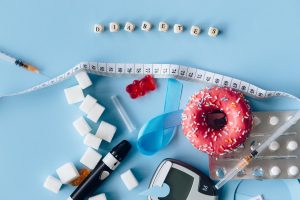Posts Tagged ‘high blood sugar symptoms’

High Blood Sugar Symptoms

High Blood Sugar Symptoms – Naturally, human beings have sugar (also known as glucose) in the blood. Normal levels of blood sugar gives energy for the cells and organs in the body to function. However, having too much is bad.
Blood sugar is naturally produced from the liver and from the muscles in the body, however, most human beings get too much from food and drinks containing carbohydrates. Hyperglycemia is a condition wherein it means that there is way too much sugar in the blood. Having too much blood sugar (or having high blood glucose) means that the body lacks enough insulin to keep blood sugar levels at a normal state.
What is insulin?
Generally, insulin is a hormone that helps the body transform the foods or drinks we consume into energy. Insulin also helps directs blood sugar to be stored in the liver, muscles, and in fat.
Without enough insulin, blood sugar will not be stored or converted to energy, and instead, it will dangerously build-up which will cause serious health problems such as diabetes.
Hyperglycemia
What is hyperglycemia? What causes hyperglycemia?
Right amounts of blood sugar is fuel for the body. However, too much does not equate to more energy… in fact, too much blood sugar causes the opposite of having a boost in energy.
| High Blood Sugar (Hyperglycemia) What is hyperglycemia? What causes hyperglycemia? Right amounts of blood sugar is fuel for the body. However, too much does not equate to more energy… in fact, too much blood sugar causes the opposite of having a boost in energy. |
High Blood Sugar Symptoms
What does it feel like to have high blood sugar?
A number of high blood sugar symptoms can happen, such as:
– Drowsiness especially right after eating
– Have headaches or other aches in the body
– Thirsty or hungry all the time
– Difficulty in concentrating
– Blurry vision
– Feels bloated
– Urinates more often
– Wounds or skin injuries might take more time to heal

Caution: Low insulin and having high blood sugar levels can lead to diabetic ketoacidosis (DKA), which is a serious complication that will need urgent medical attention.
Common symptoms may occur, such as:
– Shortness of breath
– Rapid beating of the heart
– Breath might smell fruity
– Disorientation
– Vomiting
– Dehydration
– Comatose
Blood sugar levels may reach over 250ml/dL. High blood sugar symptoms may be experienced at any time of the day, even in the morning for those who are suffering from diabetes.
What are the effects of high blood sugar in the body?
High blood sugar can lead to various symptoms and complications in the body. The following are examples of high blood sugar symptoms:
1. Frequent Urination – High blood sugar goes into the kidneys and urine which makes you more thirsty even when drinking lots of water.
2. Causes Unexplained Weight Loss – Even when there is high blood sugar in the body, high levels will cause the body’s cells to not get the glucose they actually need for burning fat and muscle.
3. Feeling Numb and Feels Tingling – High blood sugar can cause numbness, burning sensation, or tingling in the parts of the body such as the hands, legs, and even the feet. This complication of diabetes happens because of the diabetic neuropathy that happens after many years of having high blood sugar levels in the body.
High blood sugar symptoms cause harm to the body which will lead to long term complications:
1. May cause Heart Attack or Stroke
2. May cause damage or loss of eyesight.
3 May cause Kidney Problems
4. May cause skin problems such as slow healing of wounds or infections
Prevention of Hyperglycemia (High Blood Sugar)
Here are the different ways or strategies to prevent Hyperglycemia:
– Regularly check blood sugar levels, especially when it is advised by the doctor
– Take insulin, again, when advised by the doctor
– Ask for dietary help from licensed dietitians or nutritionists to ask help what your best diet would be.
– Always be mindful and take precautions to avoid any infections or certain diseases
– Get regular exercise. Home exercise or go to the gym, either way.
– Get enough sleep and avoid way too much stress as much as possible by engaging in stress-reducing activities.
Fortunately, at this day and age, testing kits for checking blood sugar levels are readily available in the market and may be purchased and used at home. For a more accurate reading, it is best to check with your doctor.
Low blood sugar (hypoglycemia)
When does low blood sugar occur? Some of the factors that increases the risk of low blood sugar includes:
a. Being diagnosed with certain medical conditions
b. Taking certain medicationsExercising too much
c. Skipping meals or eats way too little
d. Taking too much insulin can also be one that causes low blood sugar.
Low blood sugar symptoms are:
– Feels weak
– Feeling hungry
– Feeling nervous or anxious
– Feeling the chills
– Feeling irritable
– Experiencing fast heartbeat
– Palpitations
To help with hypoglycemia, fruit juice or eating something sweet will help with the symptoms. For more information about your health, it’s best to consult with your doctor.
Type 1 Diabetes
As researched by the American Diabetes Association, 5% of the population which already has diabetes suffer from the type 1 diabetes.

When the body lacks insulin, high blood sugar levels occur. Unfortunately, this happens because the immune system somehow attacks the cells in the body that produces insulin/ The cells in the pancreas produces the insulin we need in the body. If the body cannot naturally produce insulin, people, especially those with diabetes, would resort to take insulin through the methods medically available such as taking it via needle, a pen, or insulin pump. Insulin is vital in the body to keep blood sugar levels in the normal condition.
What causes Type 1 Diabetes?
In recent studies, researchers believe that people with a family history of type 1 diabetes is more likely to also be passed on to next generations. However, certain environmental factors such as viruses and infections may also cause the same.
Unfortunately, once diagnose with type 1 diabetes, there is no turning back. Dietary changes, regular exercise, or other healthy lifestyle choices will not undo it. It can happen at any time in our lives even during childhood.
Type 2 Diabetes
In this type, the body produces insulin but the problem is that the body is not able to utilize it. Yes, the pancreas makes insulin but cannot make enough to make sure the blood sugar level is at a stable or normal state. This effect is also known as “insulin resistance.” How should people take care of themselves when they have type 2 diabetes?
Taking insulin, proper medical pills, proper diet and exercise will definitely increase the chances to help manage blood sugar levels.
What causes Type 2 Diabetes?
Certain factors may cause to develop type 2 diabetes, such as the following:
- Certain genetics, especially when having a parent or sibling with type 2 diabetes
- Being overweight and being inactive most of the time
- Certain ethnicities are more prone to develop type 2 diabetes such as the African-American, Alaska Native, American Indian, Asian-American, Hispanic, or Pacific Islander ethnicity
- People who are over the age of 45 years
- People who have a blood pressure of 140/90 or higher
- Those who have low levels of good cholesterol or those who have high levels of triglycerides
Gestational Diabetes

What is gestational diabetes? This occurs when, during pregnancy, the body is experiencing insulin resistance and high blood sugar levels. It is most vital to constantly monitor pregnant women’s blood sugar levels, as it can lead to lots of health complications for both the mother and the child. After delivery, this type of diabetes usually goes away.
People who have high blood sugar or experiencing high blood sugar symptoms should visit their doctor. Each person is different and therefore have different reactions and experiences.

